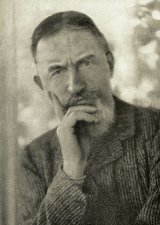Pygmalion Page #19
Pygmalion is a play by George Bernard Shaw, named after a Greek mythological figure. It was first presented on stage to the public in 1913. In ancient Greek mythology, Pygmalion fell in love with one of his sculptures, which then came to life.
HIGGINS. The devil he does! Whew! [Brightening suddenly] What a lark! PICKERING. A safe thing for you, Doolittle. They won't ask you twice. DOOLITTLE. It ain't the lecturing I mind. I'll lecture them blue in the face, I will, and not turn a hair. It's making a gentleman of me that I object to. Who asked him to make a gentleman of me? I was happy. I was free. I touched pretty nigh everybody for money when I wanted it, same as I touched you, Henry Higgins. Now I am worrited; tied neck and heels; and everybody touches me for money. It's a fine thing for you, says my solicitor. Is it? says I. You mean it's a good thing for you, I says. When I was a poor man and had a solicitor once when they found a pram in the dust cart, he got me off, and got shut of me and got me shut of him as quick as he could. Same with the doctors: used to shove me out of the hospital before I could hardly stand on my legs, and nothing to pay. Now they finds out that I'm not a healthy man and can't live unless they looks after me twice a day. In the house I'm not let do a hand's turn for myself: somebody else must do it and touch me for it. A year ago I hadn't a relative in the world except two or three that wouldn't speak to me. Now I've fifty, and not a decent week's wages among the lot of them. I have to live for others and not for myself: that's middle class morality. You talk of losing Eliza. Don't you be anxious: I bet she's on my doorstep by this: she that could support herself easy by selling flowers if I wasn't respectable. And the next one to touch me will be you, Henry Higgins. I'll have to learn to speak middle class language from you, instead of speaking proper English. That's where you'll come in; and I daresay that's what you done it for. MRS. HIGGINS. But, my dear Mr. Doolittle, you need not suffer all this if you are really in earnest. Nobody can force you to accept this bequest. You can repudiate it. Isn't that so, Colonel Pickering? PICKERING. I believe so. DOOLITTLE [softening his manner in deference to her sex] That's the tragedy of it, ma'am. It's easy to say chuck it; but I haven't the nerve. Which one of us has? We're all intimidated. Intimidated, ma'am: that's what we are. What is there for me if I chuck it but the workhouse in my old age? I have to dye my hair already to keep my job as a dustman. If I was one of the deserving poor, and had put by a bit, I could chuck it; but then why should I, acause the deserving poor might as well be millionaires for all the happiness they ever has. They don't know what happiness is. But I, as one of the undeserving poor, have nothing between me and the pauper's uniform but this here blasted three thousand a year that shoves me into the middle class. (Excuse the expression, ma'am: you'd use it yourself if you had my provocation). They've got you every way you turn: it's a choice between the Skilly of the workhouse and the Char Bydis of the middle class; and I haven't the nerve for the workhouse. Intimidated: that's what I am. Broke. Bought up. Happier men than me will call for my dust, and touch me for their tip; and I'll look on helpless, and envy them. And that's what your son has brought me to. [He is overcome by emotion]. MRS. HIGGINS. Well, I'm very glad you're not going to do anything foolish, Mr. Doolittle. For this solves the problem of Eliza's future. You can provide for her now. DOOLITTLE [with melancholy resignation] Yes, ma'am; I'm expected to provide for everyone now, out of three thousand a year. HIGGINS [jumping up] Nonsense! he can't provide for her. He shan't provide for her. She doesn't belong to him. I paid him five pounds for her. Doolittle: either you're an honest man or a rogue. DOOLITTLE [tolerantly] A little of both, Henry, like the rest of us: a little of both. HIGGINS. Well, you took that money for the girl; and you have no right to take her as well. MRS. HIGGINS. Henry: don't be absurd. If you really want to know where Eliza is, she is upstairs. HIGGINS [amazed] Upstairs!!! Then I shall jolly soon fetch her downstairs. [He makes resolutely for the door]. MRS. HIGGINS [rising and following him] Be quiet, Henry. Sit down. HIGGINS. I-- MRS. HIGGINS. Sit down, dear; and listen to me. HIGGINS. Oh very well, very well, very well. [He throws himself ungraciously on the ottoman, with his face towards the windows]. But I think you might have told me this half an hour ago. MRS. HIGGINS. Eliza came to me this morning. She passed the night partly walking about in a rage, partly trying to throw herself into the river and being afraid to, and partly in the Carlton Hotel. She told me of the brutal way you two treated her. HIGGINS [bounding up again] What! PICKERING [rising also] My dear Mrs. Higgins, she's been telling you stories. We didn't treat her brutally. We hardly said a word to her; and we parted on particularly good terms. [Turning on Higgins]. Higgins: did you bully her after I went to bed? HIGGINS. Just the other way about. She threw my slippers in my face. She behaved in the most outrageous way. I never gave her the slightest provocation. The slippers came bang into my face the moment I entered the room--before I had uttered a word. And used perfectly awful language. PICKERING [astonished] But why? What did we do to her? MRS. HIGGINS. I think I know pretty well what you did. The girl is naturally rather affectionate, I think. Isn't she, Mr. Doolittle? DOOLITTLE. Very tender-hearted, ma'am. Takes after me. MRS. HIGGINS. Just so. She had become attached to you both. She worked very hard for you, Henry! I don't think you quite realize what anything in the nature of brain work means to a girl like that. Well, it seems that when the great day of trial came, and she did this wonderful thing for you without making a single mistake, you two sat there and never said a word to her, but talked together of how glad you were that it was all over and how you had been bored with the whole thing. And then you were surprised because she threw your slippers at you! I should have thrown the fire-irons at you. HIGGINS. We said nothing except that we were tired and wanted to go to bed. Did we, Pick? PICKERING [shrugging his shoulders] That was all. MRS. HIGGINS [ironically] Quite sure? PICKERING. Absolutely. Really, that was all. MRS. HIGGINS. You didn't thank her, or pet her, or admire her, or tell her how splendid she'd been. HIGGINS [impatiently] But she knew all about that. We didn't make speeches to her, if that's what you mean. PICKERING [conscience stricken] Perhaps we were a little inconsiderate. Is she very angry? MRS. HIGGINS [returning to her place at the writing-table] Well, I'm afraid she won't go back to Wimpole Street, especially now that Mr. Doolittle is able to keep up the position you have thrust on her; but she says she is quite willing to meet you on friendly terms and to let bygones be bygones.
Translation
Translate and read this book in other languages:
Select another language:
- - Select -
- 简体中文 (Chinese - Simplified)
- 繁體中文 (Chinese - Traditional)
- Español (Spanish)
- Esperanto (Esperanto)
- 日本語 (Japanese)
- Português (Portuguese)
- Deutsch (German)
- العربية (Arabic)
- Français (French)
- Русский (Russian)
- ಕನ್ನಡ (Kannada)
- 한국어 (Korean)
- עברית (Hebrew)
- Gaeilge (Irish)
- Українська (Ukrainian)
- اردو (Urdu)
- Magyar (Hungarian)
- मानक हिन्दी (Hindi)
- Indonesia (Indonesian)
- Italiano (Italian)
- தமிழ் (Tamil)
- Türkçe (Turkish)
- తెలుగు (Telugu)
- ภาษาไทย (Thai)
- Tiếng Việt (Vietnamese)
- Čeština (Czech)
- Polski (Polish)
- Bahasa Indonesia (Indonesian)
- Românește (Romanian)
- Nederlands (Dutch)
- Ελληνικά (Greek)
- Latinum (Latin)
- Svenska (Swedish)
- Dansk (Danish)
- Suomi (Finnish)
- فارسی (Persian)
- ייִדיש (Yiddish)
- հայերեն (Armenian)
- Norsk (Norwegian)
- English (English)
Citation
Use the citation below to add this book to your bibliography:
Style:MLAChicagoAPA
"Pygmalion Books." Literature.com. STANDS4 LLC, 2025. Web. 11 Jan. 2025. <https://www.literature.com/book/pygmalion_78>.




Discuss this Pygmalion book with the community:
Report Comment
We're doing our best to make sure our content is useful, accurate and safe.
If by any chance you spot an inappropriate comment while navigating through our website please use this form to let us know, and we'll take care of it shortly.
Attachment
You need to be logged in to favorite.
Log In